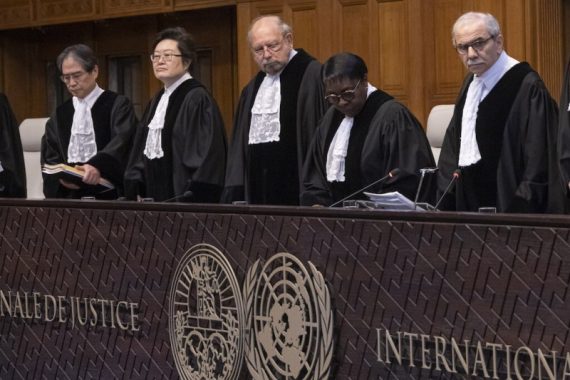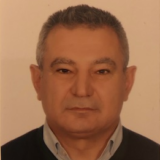T
he magnitude of the number of Palestinians killed or injured as a result of Israel’s attacks on Gaza since October 7 and the pattern of Israel’s actions have led to the widespread conviction that Israel is committing a genocide in Gaza. Israel’s attacks not only constitute war crimes and crimes against humanity but are also characterized as “acts amounting to genocide” or “genocide.”
While acts of forcible transfer of civilian populations or the creation of an ethnically homogeneous geographical region through mass murder constitute the crime of ethnic cleansing, acts that indicate the existence of an intent to destroy the Palestinian people in whole or in part amount to the crime of genocide.
Thus, the Republic of South Africa filed a petition with the International Court of Justice on December 29, 2023, on the grounds that Israel has violated certain obligations, such as to prevent the commission of genocide within the scope of the Genocide Convention and to punish those who have committed it, and has violated certain other obligations by its actions against Palestinians in the Gaza Strip.
South Africa argued that Israel’s acts and omissions constitute acts of genocide committed with specific intent to destroy the Palestinians in the Gaza Strip as part of a broader Palestinian national, racial, and ethnic group, and that Israel’s state organs, state officials, and, following its instructions or direction, other persons and entities acting under its control have violated its obligations under the Genocide Convention in relation to the Palestinians in the Gaza Strip.
The specific acts cited in South Africa’s application are “committing genocide”; “aiding and abetting genocide”; “directly and publicly inciting genocide”; “attempting to commit genocide”; “participating in genocide”; and “failing to punish those who have committed the crime of genocide or any of the acts enumerated in Article 3,” meaning the acts of “failing to enact legislation necessary to give effect to this Convention” and “failing to prosecute persons accused of committing an act of genocide or any of the acts enumerated in Article 3.”
In its application, South Africa found that Israel had violated the abovementioned obligations and requested that interim measures be taken to prevent further harm to the Palestinian people while the case is pending.
South Africa’s request for interim measures
In general, applications to the court under Article 41 of the Statute of the Court and Articles 73, 74, and 75 of the Rules of Procedure of the Court request protective measures to prevent the act or acts which are the subject of the application from causing irreparable damage to the protected rights while the case is pending. An interim measure may also be requested. Under Article 41 of the Statute and Article 75 of the Rules of Procedure, the court is empowered to prescribe provisional measures to protect the rights of any party if it considers that the situation so requires, even in the absence of a separate application.
This request, also known as an interim or provisional order, must be given priority and urgency under Article 74 of the court’s Internal Rules. For this reason, the court first examines whether it has jurisdiction to hear the case in general, not in detail, and if it decides that it has prima facie jurisdiction, it immediately examines and decides on the request for interim measures.
South Africa requested that the application for interim measures be decided by the court as a matter of urgency and requested a series of interim measures with respect to the Palestinian people, a group protected by the Genocide Convention.
In specific, South Africa requested from the court to immediately suspend Israel’s military operations in and against the Gaza Strip in order to protect the Palestinian people from genocide, pending the determination of the case, and to prevent and punish all such actions by all organizations and individuals associated with Israel. The court must prevent the commission of acts within the scope of Article 2 of the Genocide Convention (such as killing members of the group; causing serious bodily or mental harm to members of the group), forcible deportations of the population, denial of access to adequate food and water, and access to adequate fuel and shelter. South Africa asked the court to issue a decision that would include measures such as halting access to humanitarian aid, including clothing, hygiene, and medical supplies and assistance.
The court’s decision on precautionary measures and its significance
The court announced its decision on South Africa’s application for precautionary measures on January 26, 2002, some four weeks after the application was made. Because the court had to consider, albeit in general terms, whether it had jurisdiction to hear the case before taking a decision, the decision addressed this issue first and foremost, stating that the court had jurisdiction to hear the case. In other words, the court clearly stated that South Africa had the authority to file an application, i.e. a lawsuit, against Israel and that the question of the crime of genocide went to the merits of the case.
The court then considered South Africa’s request for precautionary measures. In this regard, it first determined, with reference to the actions taking place on the ground and the statements made by the Israeli authorities, that there was a risk that the acts prohibited by the Genocide Convention would take place, and that there was therefore a substantial risk that both the existence of a society and the right to life of individuals would be violated. Although this finding does not constitute a final acceptance that the crime of genocide has been committed, it should be considered an important judicial finding even at this stage, in the sense that it establishes that there is a serious risk or possibility in this direction.
In this context, Israel must take urgent measures to ensure that its armed forces do not carry out any of these actions.
Secondly, Israel is obliged to take all measures within its power to prevent and punish direct and public incitement to genocide against members of the Palestinian group in the Gaza Strip.
Thirdly, Israel must take urgent and effective measures to ensure the provision of much needed basic services and humanitarian aid to address the adverse living conditions of the Palestinian people in Gaza. Therefore, Israel must cease its attacks and actions that would partially or completely impede the basic needs of the civilian population, contrary to what it has been doing since the beginning of its attacks and continues to do.
Recommended
Finally, Israel must prevent the destruction and ensure the preservation of evidence relating to allegations of acts against Palestinians in Gaza under Articles 2 and 3 of the Genocide Convention.
The main expectation regarding South Africa’s request for preventive measures is that the council will decide to stop all Israeli attacks on Gaza. In fact, South Africa’s first request in the context of measures was that the state of Israel immediately suspend its military operations in and against Gaza. Apparently, the court felt that in order to stop actions that could lead to genocide, it was necessary to stop operations and activities that could lead to genocide, rather than to stop all attacks.
The measures requested by the court are essentially actions such as not targeting civilians, not attacking civilian places, ensuring that the basic needs of civilians are met, and preventing and punishing discourse and initiatives that encourage genocide and related actions.
Although the court has not clearly articulated a measure that would mean a ceasefire, it is important that it directly lists the actions mentioned above and listed in Articles 2 and 3 of the Genocide Convention, and demands that these actions stop, and even that the Israeli forces stop their attacks on Gaza. In a sense, it means that attacks on civilians and civilian settlements must cease completely and that such attacks must be acknowledged for what they are.
According to Article 41 of the Statute of the Court, preventive measures are transmitted to the parties to the case and to the UN Security Council for necessary action. If the party concerned does not comply with the requirements of the resolution or does not comply in an appropriate manner, the UN Security Council must take coercive measures. However, it seems unlikely that the Security Council will act in this case due to a veto from the United States, which has already declared its opposition to the case,
Israel will be expected to fulfil the requirements of the decision and submit a report to the court within one month at the latest. Yet, since the court’s decision does not contain any clear measure, such as the cessation of all operations, in practice Israel may distort the requirements of the decision How can you pretend to implement by violating them on the grounds of “self-defense,” which it has been using unfairly for a long time. To achieve an end to the ongoing genocide, it is not the UN Security Council, but the attitudes and discourses of states, their monitoring of the issue, and the pressure of the international community that are of utmost importance.





